
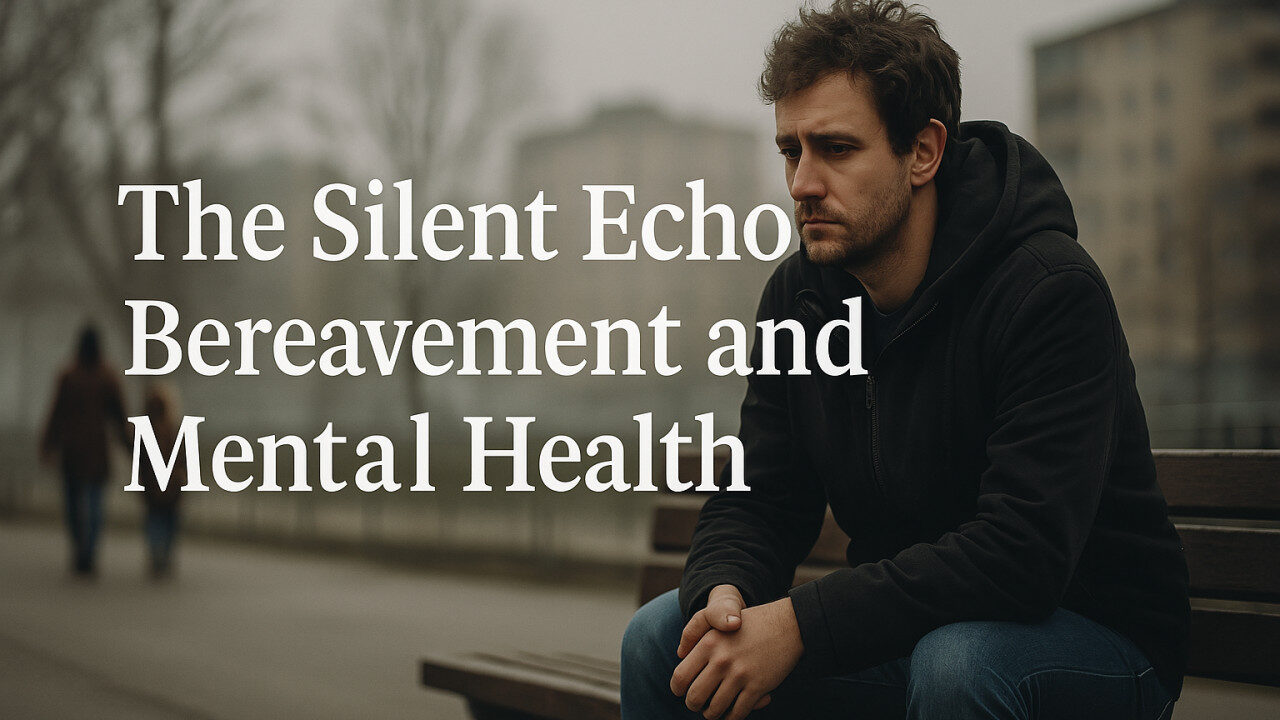
Imagine being ten years old and suddenly, the world as you know it shatters. A parent, a sibling, a grandparent – gone. There’s a seat at the dinner table that will never be filled again, a bedtime routine that vanishes overnight. For children, teenagers, and young adults bereavement is not just loss; it’s an earthquake that shakes the very foundation of their reality.
What happens to that child or teenager when they grow up? Do they “get over it,” as society often suggests? Or does grief embed itself into their bones, shaping the adult they become? The truth is, bereavement leaves a lasting imprint, often influencing mental health well into adulthood.
This is not about sadness alone. It’s about anxiety, depression, PTSD, identity crises, attachment issues, and struggles with self-worth. It’s about people who never got the chance to process their grief, who grew up believing that emotions should be buried just like their loved one. It’s about understanding that bereavement isn’t just something that happens – it’s something that rewires a person’s very being.
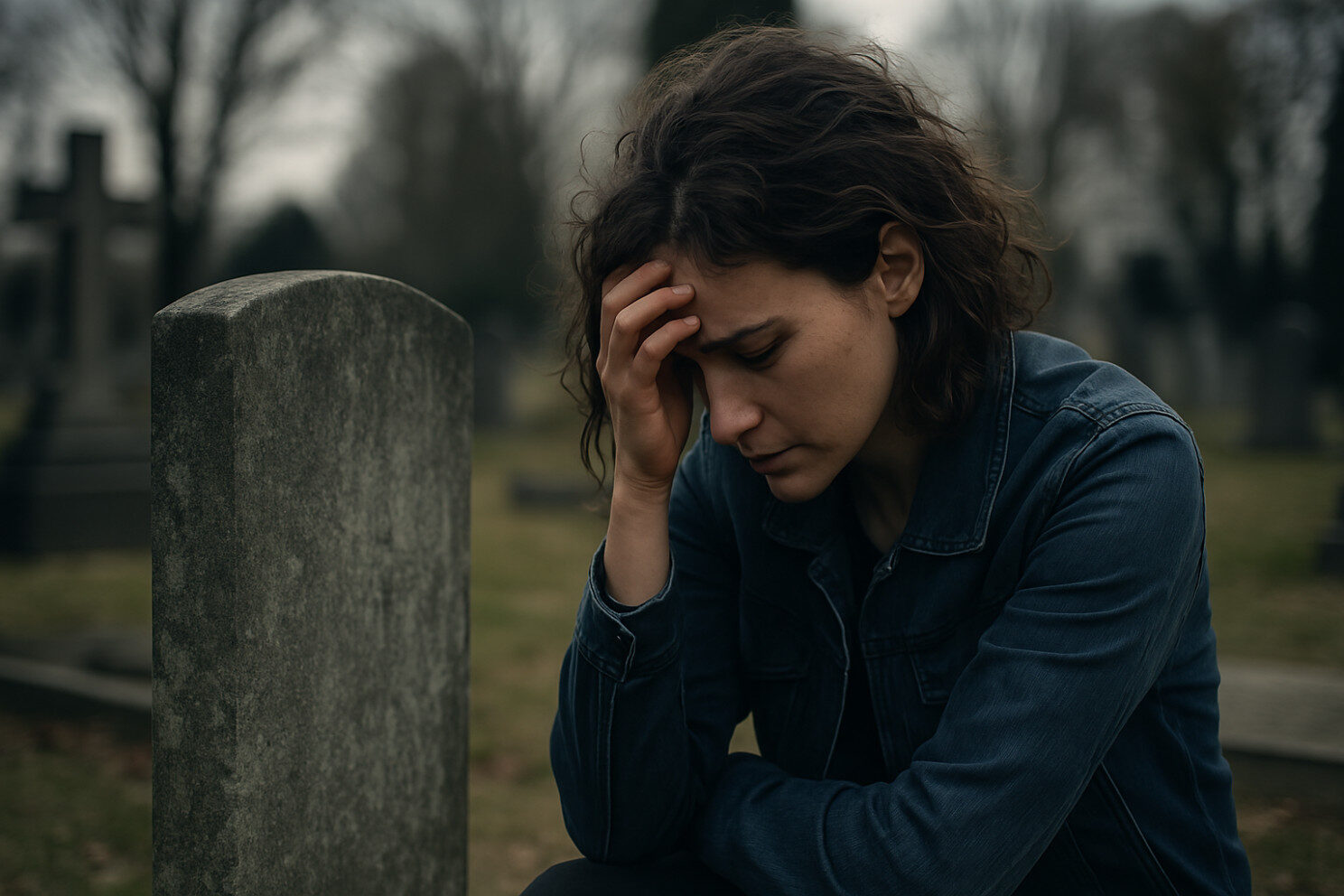
“Grief that was never spoken becomes a weight carried for life. This is not just loss – it’s identity rewritten by silence.”
This post is not just about grief. It’s about how grief reshapes the adult mind – how it lingers beneath the surface, influencing emotions, relationships, and mental well-being. It’s about the children and teenagers who were told to “be strong” and the adults who are still carrying the weight of that strength. Most importantly, it’s about understanding how we as human beings, can help those still living in the shadow of bereavement.
The truth is, grief doesn’t stay in one position. It grows with you. If left unspoken, it finds new ways to be heard.
Grief in childhood is often overlooked. Society tends to focus on how a child or teenager copes in the immediate aftermath of loss – whether they cry, whether they “act out,” whether they seem to “get over it.” Bereavement is not just a temporary disruption; it is a fundamental shift in a young person’s understanding of the world. It changes the way they perceive safety, love, trust, and stability. When unresolved, it follows them into adulthood, shaping their mental health in ways that are often invisible but deeply ingrained.
A bereaved child or teenager may grow up believing that loss is inevitable, that love is fragile, that attachment is temporary. They may struggle with deep-seated anxiety, always waiting for the next person to disappear. They may detach entirely, afraid to connect because loss has already taught them that nothing is permanent. The echoes of grief do not fade with time – they reveal themselves in relationships, self-worth, identity, and the very fabric of adult mental health.
“When a child loses a parent or someone central to their world, it creates a fault line in their identity. It disrupts their sense of safety, of belonging, of being loved. Many learn to mask the pain, to keep it locked away. What is suppressed in childhood will always find a way to resurface in adulthood – whether through anxiety, depression, or a deep, unspoken fear of abandonment.” (Samuel, J., Grief Works: Stories of Life, Death, and Surviving, 2017)
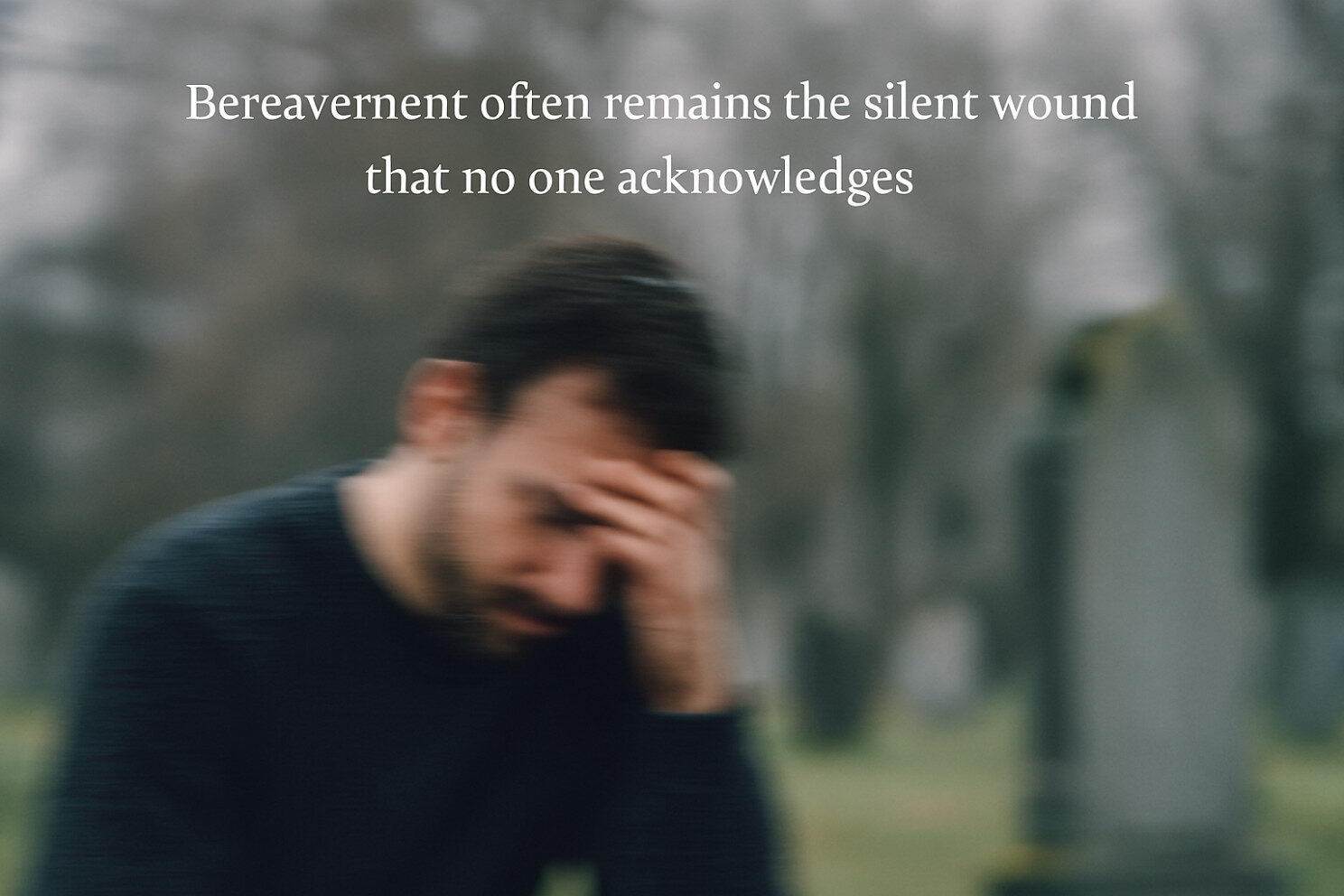
For many adults struggling with mental health today, the root of their anxiety, depression, or emotional detachment can be traced back to an early loss that was never fully processed. Yet, in a culture that prioritises “moving on,” bereavement often remains the silent wound that no one acknowledges – until it begins to affect the way they love, trust, and see themselves decades later.
“Grief that was never spoken becomes disconnection. This is reflected by the emotional blur of unprocessed childhood loss carried silently into adulthood.”
Losing a loved one as a youngster does not just create a void in the past – it shapes the future. The impact of bereavement does not fade with time, nor does it disappear as a person enters adulthood. Instead, it integrates into their personality, their behaviours, their fears, and their ability to connect with others. It becomes the lens through which they experience relationships, emotional security, and their own self-worth.
Studies have consistently shown that childhood and teenage bereavement is a significant risk factor for mental health challenges in later life. A 2021 study published in The Lancet Psychiatry found that:
“Individuals who experienced the death of a parent or sibling in childhood were significantly more likely to develop depression, anxiety, and PTSD in adulthood” (Berg et al., 2021).
The way this grief shows itself is deeply personal – some internalise it, some project it outward, and others carry it as an unnamed weight for decades before realising its hold on them.
The effects of bereavement are vast, but the following six themes are among the most commonly seen in adulthood.
When a youngster experiences the sudden loss of a loved one, their sense of stability is shattered. They learn, at a young age, that the people they rely on can be taken away without warning. This can create an overwhelming fear of future loss – one that carries into adulthood in the form of chronic anxiety and hypervigilance.
Adults who experience bereavement as a youngster often struggle with catastrophic thinking, where they constantly anticipate worst-case scenarios. They may become excessively protective of loved ones, fearing that any moment apart could be the last. Some develop health anxiety, obsessing over symptoms and fearing death, while others avoid deep relationships altogether, believing that attachment only leads to pain.
“When a child’s world is abruptly changed by loss, they learn that safety is not guaranteed. Many grow into adults who are always scanning for the next disaster, always preparing for the next goodbye.” – Megan Devine, It’s OK That You’re Not OK (2017)
For these individuals, the world never feels truly safe again. Their nervous system remains on high alert, bracing for the next heartbreak before it even arrives.
For many children and teenagers, especially those who are not given the space to grieve openly, the loss they experienced remains locked inside them. They are told to “be strong,” to “carry on,” to avoid burdening others with their sadness. In adulthood, this suppressed grief can manifest as persistent depression, emotional numbness, and a profound sense of emptiness.
Adults with unprocessed grief may describe feeling disconnected from life, struggling to find meaning or joy. They may appear functional on the outside but feel hollow within. Suppression of grief has been linked to complicated grief disorder, a condition where unresolved loss leads to prolonged and debilitating emotional distress.
One of the most damaging messages youngsters receive after a bereavement is that grief is something to “get over.” Remember, grief is not linear. It does not fade neatly with time – it waits and if it is not processed when it occurs as a youngster, it will return in adulthood, often in the form of depression.
“Grief is not something you complete. It is not a task to finish and move on. It is an ongoing part of who you are.” – David Kessler, Finding Meaning: The Sixth Stage of Grief (2019)
Love and loss become deeply intertwined for a bereaved person. When the people they love most vanish without warning, it can send one of two messages:
Cling tightly to those you love, because they might disappear.
Avoid deep connection, because everyone leaves eventually.
This appears in adulthood as attachment anxiety (excessive fear of abandonment, need for reassurance) or avoidant attachment (difficulty trusting, fear of vulnerability). Studies show that those who experience significant loss as a youngster are more likely to have insecure attachment styles in adult relationships.
These individuals may sabotage relationships before they get too deep, or they may become emotionally dependent on partners, seeking constant reassurance that they won’t be abandoned. Some struggle with deep trust issues, convinced that loss is inevitable.
“Early loss teaches us that love is fragile. And so we spend our lives either chasing it or pushing it away, afraid of feeling that pain again.” – Francis Weller, The Wild Edge of Sorrow (2015)
A child’s mind seeks explanations for the unexplainable whilst a teenager’s mind challenges the boundaries of the known, seeking to understand and redefine the world around them. When a loved one dies, especially suddenly or traumatically, children and teenager’s may internalise blame. Even when they are given logical reasons for the loss, an unspoken belief can form:
“If I had been better, would they have stayed?”
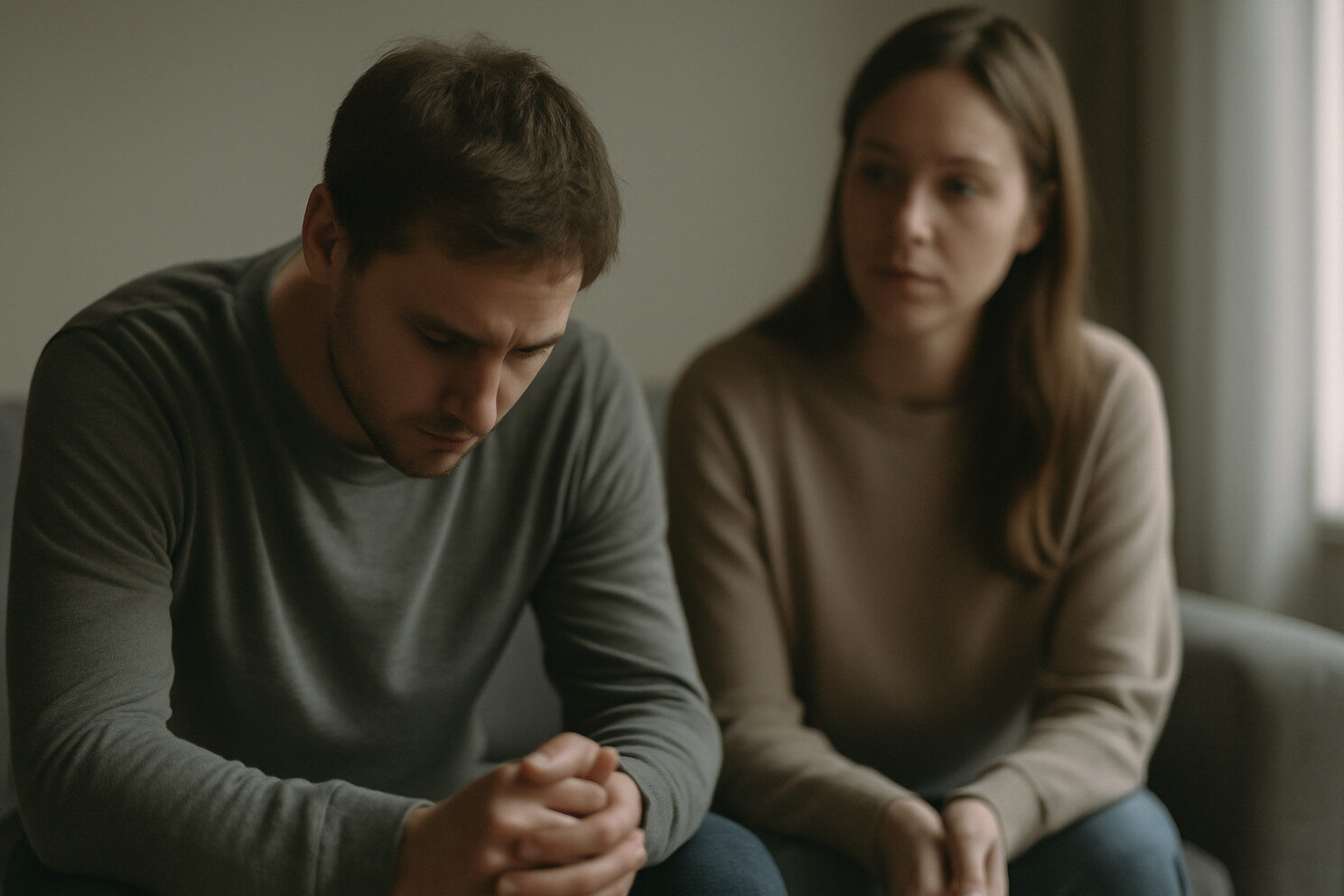
This guilt can reveal itself in adulthood as chronic self-doubt, feelings of unworthiness, and difficulty accepting love. Some carry the burden of “survivor’s guilt,“ believing that they should have done something to prevent the loss. Others overcompensate by becoming perfectionists, striving endlessly to “earn” their place in the world.
“Guilt has a voice that whispers in silence – ‘You weren’t enough.’ This reflects the hidden weight of childhood loss carried quietly into adulthood.”
“Children who experience loss often grow into adults who never quite feel like they are enough.” – Hope Edelman, Motherless Daughters (2014)
For youngsters who experienced a sudden, violent, or traumatic bereavement (such as an accident or suicide), the impact can be as severe as PTSD. The brain may replay fragments of the loss in adulthood, triggered by smells, sounds, anniversaries, or similar experiences.
PTSD symptoms include:
In adulthood, these individuals may avoid talking about grief entirely, as doing so risks reopening a deeply painful wound.
Many bereaved youngsters grow up being told to “be strong.” In adulthood, this translates into a fear of vulnerability. They become the ones who support others, but never ask for help themselves. They keep their emotions locked away, believing that showing pain is a sign of weakness.
This emotional armour may protect them from further loss, but it also isolates them. Many struggle with deep loneliness, even in relationships, because they never allow others to see their true selves.
“When we are not taught to grieve, we are taught to hide.” – Cheryl Strayed, Tiny Beautiful Things (2012)
Beyond these core effects, bereavement has been linked to a range of other mental health disorders, including:
Every individual’s experience with the loss of a loved one is different, and while some navigate grief with resilience, others may find themselves struggling with deep emotional wounds that surface in unexpected ways.
Grief does not disappear – it transforms, and with the right support, it can be carried, understood, and lived with, rather than buried in silence.
Grief does not fade with time – it transforms. For many adults who lost someone as a child, bereavement is not a past event, but an ongoing presence, shaping their emotions, relationships, and mental well-being in ways that are often difficult to articulate.
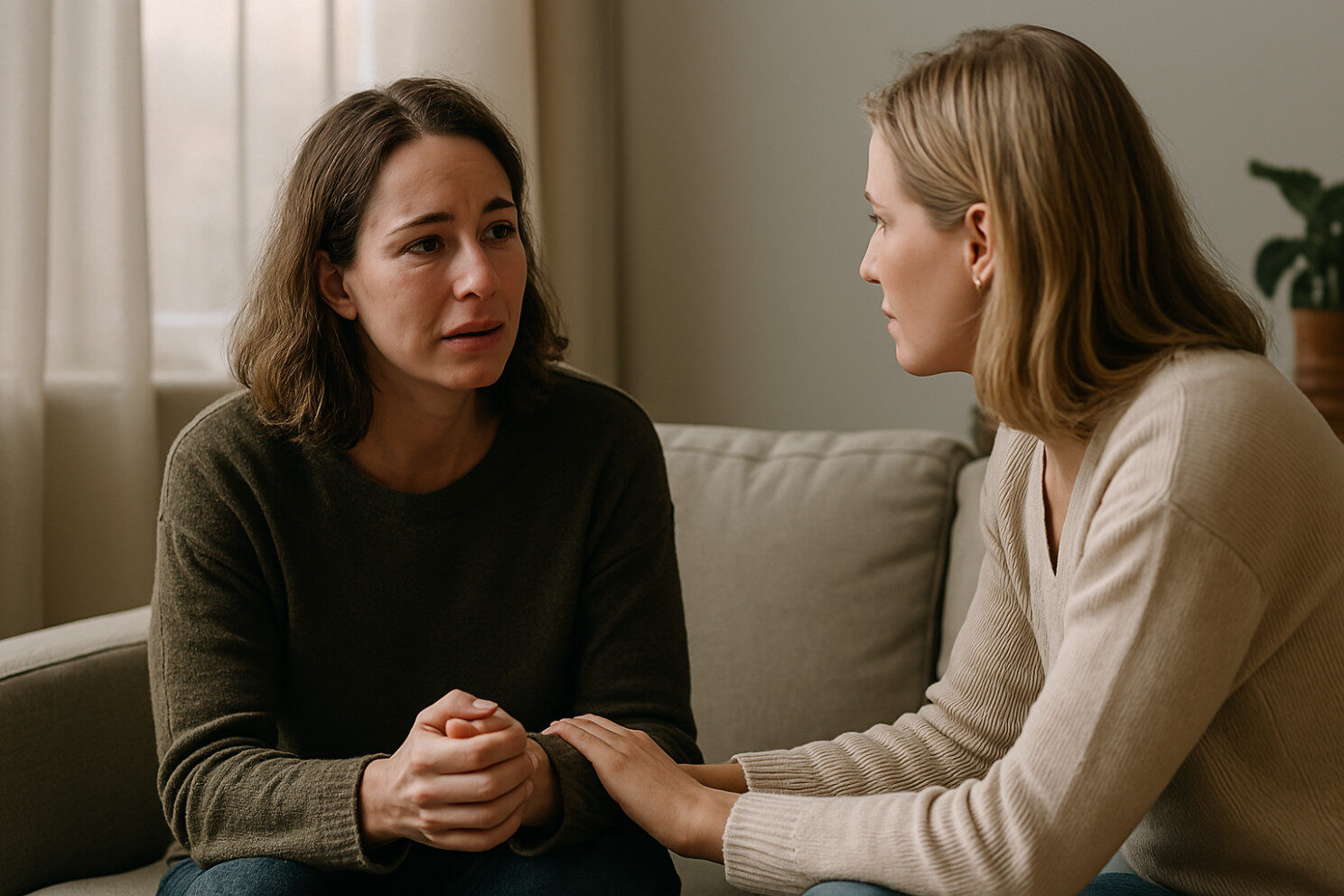 As a Mental Health First Aider (MHFA), a friend, or a colleague; being invited into a conversation about bereavement is both a privilege and a responsibility. It is not about having all the answers – it is about offering a safe, understanding space where someone can express what has often remained unspoken for years, sometimes even decades.
As a Mental Health First Aider (MHFA), a friend, or a colleague; being invited into a conversation about bereavement is both a privilege and a responsibility. It is not about having all the answers – it is about offering a safe, understanding space where someone can express what has often remained unspoken for years, sometimes even decades.
“A Mental Health First Aider doesn’t need all the answers – just the courage to listen and hold space for grief.”
This section is not a step-by-step guide, it is a reflection on what to know, how to listen, and how to hold space for someone navigating the long shadow of grief.
One of the biggest misconceptions about bereavement is that because it happened “so long ago,” it must no longer hurt. Grief doesn’t work like that. A loss experienced at the age of six or ten is processed by a child’s mind in ways they cannot fully comprehend at the time. As they grow, so does their grief – changing shape as their understanding of the world deepens.
Psychotherapist Julia Samuel, a leading expert in grief, describes it as “a story that continues to unfold within us.” She writes:
“Children experience loss again and again throughout their lives, as each new stage of development brings a deeper awareness of what they have lost. The grief does not fade—it changes as they do.” (This Too Shall Pass, 2020)
As an MHFA, or simply as someone offering support, acknowledge that a persons grief is still valid, still real, still worthy of conversation – no matter how many years have passed.
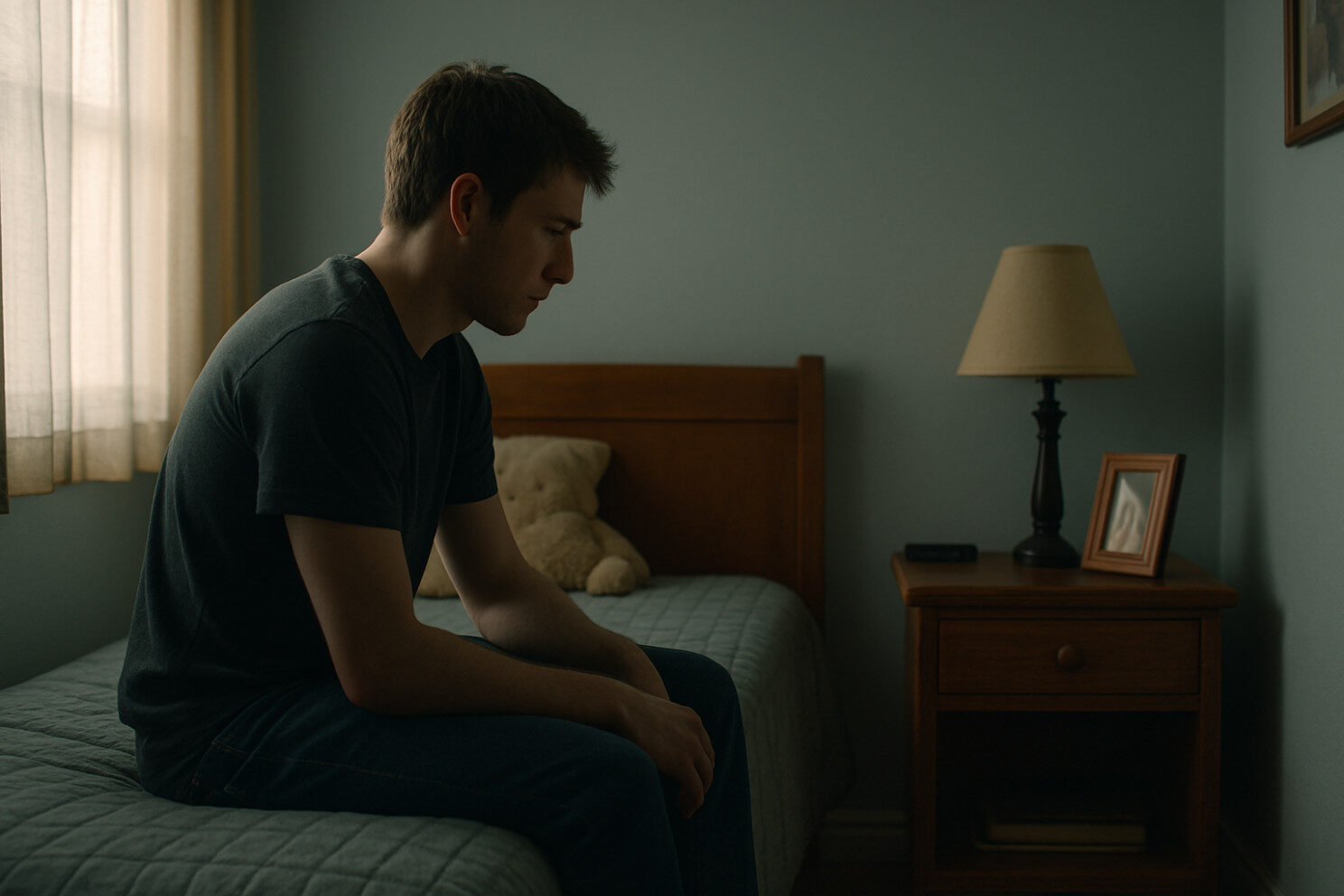 Many adults who lost a parent, sibling, or loved one as a youngster never had the chance to grieve openly, or to say goodbye. They were often told to be strong, to move on, to stop dwelling on the past. Some never even heard their loved one’s name spoken again.
Many adults who lost a parent, sibling, or loved one as a youngster never had the chance to grieve openly, or to say goodbye. They were often told to be strong, to move on, to stop dwelling on the past. Some never even heard their loved one’s name spoken again.
“Some were told to forget, to move on, to stay strong. But grief that’s silenced in childhood often lingers for a lifetime, waiting for the space it was never given.”
A study by Child Bereavement UK found that 68% of adults who lost a parent before the age of 16 felt their grief was ignored or downplayed by those around them (Child Bereavement UK, 2022).
This means that by the time they are sitting in front of you – whether in a professional setting, a workplace, or even just a casual chat – you might be the first person who has ever genuinely invited them to talk about it.
As an MHFA, your role is not to fix this, but to offer them something they may have never had before – permission to feel.
Instead of saying:
“That must have been hard, but at least you were young.”
Try saying:
“That must have been incredibly difficult. Do you want to talk about how it has affected you?”
A small shift in approach can validate their grief, rather than minimising it.
Grief is not something that is ever “completed.” Many people who lost someone as a youngster can function perfectly well in daily life, only for their loss to resurface unexpectedly – perhaps triggered by an anniversary, a life event, or even becoming a parent themselves.
A study published in The Journal of Affective Disorders found that individuals who lost a parent as children were more likely to experience waves of depression and anxiety in response to major life changes (Kaplow et al., 2018).
If you are meeting with someone about their bereavement-related mental health struggles, understand that they may have been fine for years – only for their grief to suddenly feel overwhelming again.
Instead of assuming they are “relapsing,” recognise that grief moves in unpredictable waves. Encourage them to talk about why it is resurfacing now, rather than making them feel as if they are “going backwards.“
People who lost someone as a child often develop deep-rooted survival mechanisms to cope with their loss. As an MHFA, it is important to recognise these defences without forcing them down.
Common emotional barriers include:
How to Respond as an MHFA:
If they deflect with humour, smile – but gently invite them to go deeper:
If they minimise their own pain, reassure them that their grief is valid:
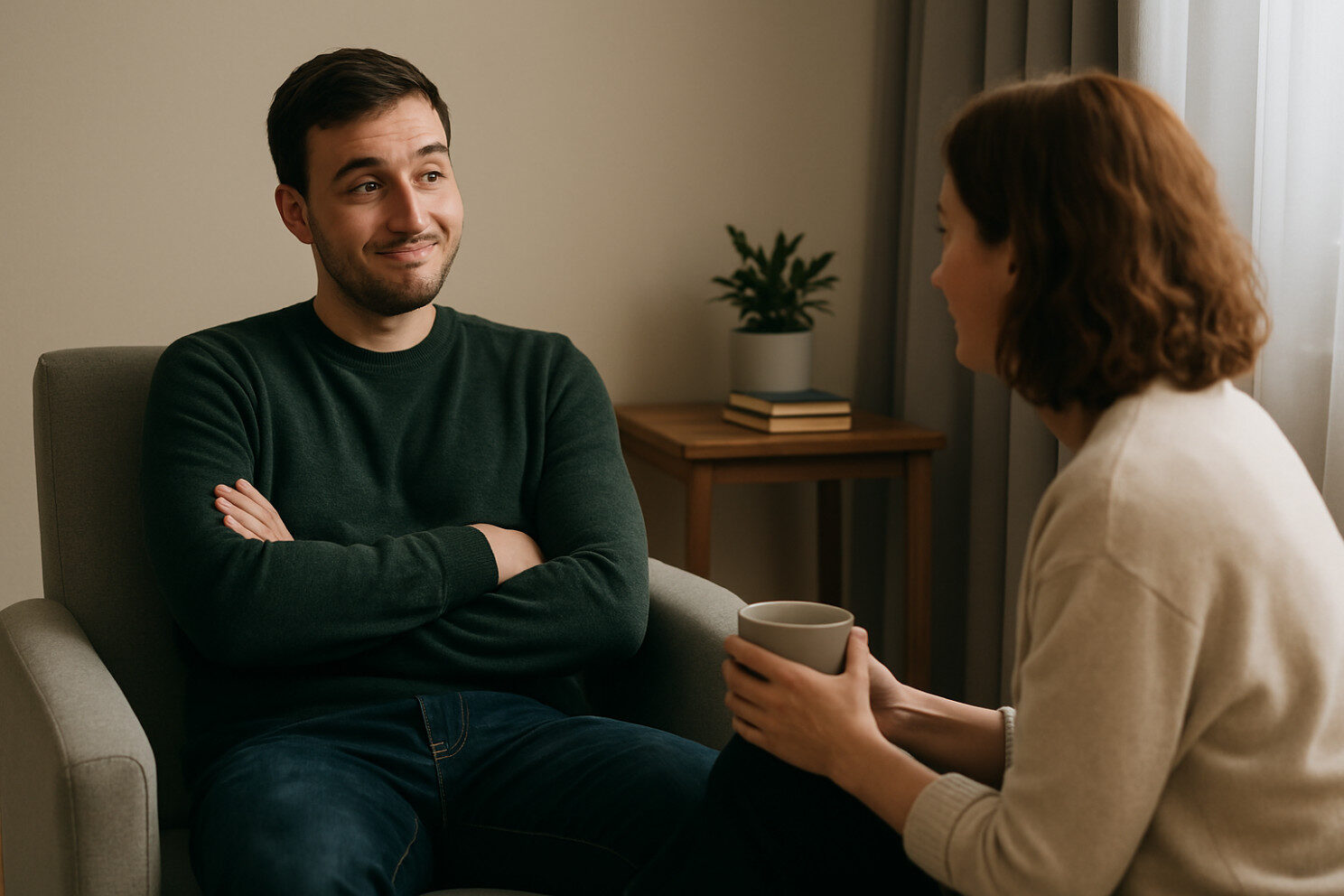 By meeting them where they are, rather than pushing for deeper emotions too soon, you help create an environment where they feel safe to open up when they are ready.
By meeting them where they are, rather than pushing for deeper emotions too soon, you help create an environment where they feel safe to open up when they are ready.
“Not everyone shows their grief with tears. Sometimes it’s humour. Sometimes it’s silence. As an MHFA, the power lies in recognising the defence – and gently holding space behind it.”
If you are having a one-to-one meeting about bereavement and mental health, where you meet matters.
Avoid:
Better alternatives:
If meeting virtually, suggest a camera-optional call to allow them to express emotions without feeling watched.
One of the biggest fears people have when discussing bereavement is saying “the wrong thing.” The reality is, there is no perfect phrase that will heal grief.
What people remember is not the words – but the feeling of being heard.
If you do not know what to say, silence is better than platitudes.
Avoid phrases like:
Instead, say things like:
Your presence, patience, and willingness to listen without judgment will be remembered long after the conversation ends.
Grief is not a moment in time – it is a companion for life. It does not fade because years have passed, nor does it lessen because the world expects it to. For those who lost someone as a young person, bereavement is not just something that happened to them – it is something that shaped them. It is woven into their identity, influencing the way they love, trust, and see themselves.
Many individuals are never given permission to grieve. They are told to be strong, to carry on, to “move forward” as though grief were a hurdle to clear rather than something to be carried. They did what youngsters do best: they adapted. They learned to suppress their pain, to mask their sadness, to live in a world that was never quite safe but to pretend, for everyone else’s sake, that it was.
“Grief doesn’t always look like tears. Sometimes it’s silence between strangers – each carrying a story they were never allowed to tell.”

Grief does not disappear simply because it has been ignored. It waits. It shows up in anxiety that whispers, “What if I lose someone else?” It lingers in relationships, where trust is difficult and attachment feels like a risk. It resurfaces in adulthood in ways that are unexpected and, at times, overwhelming.
As Mental Health First Aiders, professionals, and human beings, the greatest gift we can offer is not advice, not solutions, but presence. Grief is not a problem that can be solved – it is an experience to be honoured. Honouring grief means listening without judgement, creating space for it to exist, and letting someone know that their pain is valid, no matter how long it has been.
If you take nothing else from this post, let it be this:
Listening is the most powerful act of support. Not offering quick fixes. Not trying to change how a person feels, but simply allowing grief to be spoken aloud, without fear of dismissal – Mark V2.0 – 31 March 2025.
For anyone carrying the silent weight of bereavement, know this: Your grief matters. Your loss matters. You do not have to carry it alone.
My story? I lost my Grandparents in 1997, my mom in 2007 – I never got chance to say goodbye to my Grandparents due to family intervention and that anger still eats away at me, but now I am in control of my life, and my future.
I did get to say goodbye to my Mom and that was tuff, emotional and its effect? well I still feel it every year on special days.
💙 If this post resonates with you, share it. Talk about it. Let’s break the silence. Let’s create a world where childhood bereavement is acknowledged, understood, and supported – not just in childhood, but for the lifetime that follows.

Microsoft Solution Architect, Senior Project Manager, and Mental Health Advocate